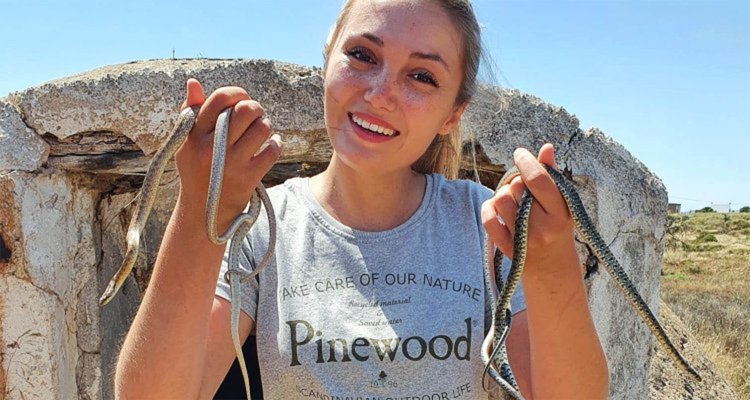
Interview
Presenter Sterrin Smallbrugge: I knew when I was still at secondary school that I wanted to go to Wageningen
During the Wageningen Experience Day on October 7, writer, presenter and reptile expert Sterrin Smalbrugge will give a performance for children with an additional meet & greet. Sterrin studied in Wageningen and is currently doing PhD research. ‘Wageningen has a very good ecology department, and pays attention to the interaction between humans and animals.’
During the Wageningen Experience Day on October 7, writer, presenter and reptile expert Sterrin Smalbrugge will give a performance for children with an additional meet & greet. Sterrin studied in Wageningen and is currently doing PhD research. ‘Wageningen has a very good ecology department, and pays attention to the interaction between humans and animals.’
WUR-alumna Sterrin Smalbrugge (29) lives half of the year with her boyfriend in the Sierra Nevada in Spain. There are no terraria full of snakes or other reptiles. Quite surprising for someone who presented an educational show about reptiles, plays the main role in the Videoland programme Reptile-mad, has written two children’s books and one for adults about reptiles, and is an ambassador for National Geographic Junior. ‘We’ve turned our house and its grounds into a paradise for nature. We’ve created a pond for toads and a rabbit warren, and hung up bat nesting boxes. In the evening we often switch off Netflix to enjoy our own gecko soap on the walls of our house. All sorts of intrigue goes on between those creatures.’
When Smalbrugge was a child, she and her father used to watch The Crocodile Hunter on Animal Planet, which was presented by Steve Irwin, an Australian animal expert with a penchant for reptiles. ‘I’m in love with all animals, and I get on better with them than with people. But I always thought it was strange and unfair that some animals have a higher cute factor than others. Why do children have posters of lions or pandas on their walls and not of snakes? Steve Irwin was crazy about reptiles and I still remember an episode in which he, a tough crocodile hunter, wept buckets over the death of a crocodile. That made a big impression on me. He was my hero. When he died while filming, I decided at the age of 12 that, just like Steve, I wanted to speak up for animals that people are scared of.’
In comparison with Steve Irwin and Freek Vonk, what is your presentation style?
‘The focus on TV is usually on the animals’ sharp teeth and other dangerous facts about them. To me it’s more important to highlight the sociable side of animals. The way the crocodile’s sharp jaw is used to carry its babies around, for instance. I’m not trying to say: look how brave I am with these dangerous animals. If you take away that over-the-top masculine bravado, girls can also think, hey, I could do that too.’
Even as a student in Wageningen, you gave well-attended lectures about reptiles.
‘That’s right. I gave lectures about the king cobra and the hidden power of reptiles, and I held an evening on the anatomy of snakes. Those lectures were a real baptism by fire but even though I was nervous, I was very keen to do it. If I wanted to pass on my knowledge about animals, I had to get up and do it. It helped to do it with my Animal Sciences teacher Arie Terlouw. He gave me fantastic guidance. There wasn’t a herpetology department, but I took zoology courses with him and he sat with me for hours to expand my knowledge about reptiles. In that sense I was an atypical student. I hardly ever went out on the town. My aim was to graduate with distinction and apart from attending classes, I spent most of my time studying so I could learn as much as possible about reptiles.
Why did you choose Wageningen, even though the the focus there wasn’t on reptiles?
‘Leiden was a more obvious choice in that respect, but I looked into it in depth and attended a lot of open days. As a result, I knew when I was still at secondary school that I wanted to go to Wageningen. I think it’s important to study animals as part of the ecosystem. Wageningen has a very good ecology department, and pays attention to the interaction between humans and animals. Besides, there is a lot of scope for personal supervision by teachers there. That is also why I am now doing my PhD with Frank van Langevelde in the Wildlife Ecology and Conservation Group. That personal contact is truly unique to Wageningen. When teachers see that you have a real passion for something, they give you plenty of scope for cultivating it. The more the university grows, the harder it gets for teachers to give students that kind of attention.
A few years ago, you said too little research was done on reptiles. Have things improved since then?
‘Luckily there have been some new discoveries since then, especially about the social life of reptiles. But there is still a lot of unexplored territory. We don’t even know the size of the populations of many species. That is part of what makes working with reptiles so nice – there is still so much scope for new, ground-breaking discoveries. I can really recommend it to students.’
Is your PhD-research about reproduction in reptiles?
‘No, that is about the ecological trap hypothesis. Animals use evidence from their surroundings to find new habitats, but they can make wrong choices if a habitat seems more attractive than it really is. Dead reptiles and amphibians are often found in irrigation channels and water troughs for livestock. I want to find out what triggers attract them to such places, and why they die there. In my spare time and on holiday, I’m always nosing around wells and water tanks, saving reptiles and amphibians. I am busy with reptile conservation all the time.’
Wageningen Experience Day for alumni and employees
Are you an alumnus or a WUR employee? learn
more about growing crops on Mars and the moon.
You can register for the Wageningen Experience Day on this page and you can also find the full programme here.
